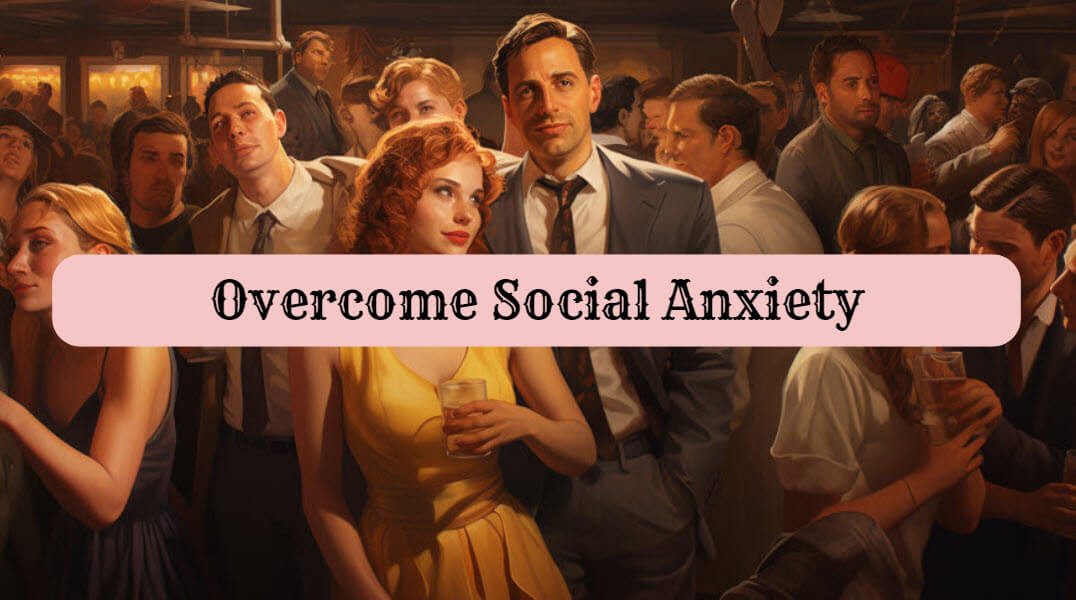Social anxiety, also known as social phobia, is a common mental health condition that can significantly impact an individual’s quality of life. In this article, we will delve into the complexities of social anxiety, exploring its causes, symptoms, and the profound effects that it can have on daily interactions and overall well-being. By understanding the nature of social anxiety and learning effective strategies for managing and overcoming it, individuals can regain confidence, improve their social interactions, and lead more fulfilling lives.
Table of Contents
Introduction
Defining Social Anxiety
Social anxiety is like that friend who shows up uninvited right when you’re about to shine, making you second-guess every word you say and every move you make. It’s that nagging feeling of fear and self-consciousness that creeps in when facing social situations, leading to excessive worry about judgment and rejection.
Prevalence and Impact
Social anxiety isn’t just an exclusive club; it’s more like a crowded room where many people feel out of place. It’s one of the most common anxiety disorders, affecting around 15 million adults in the US alone. The impact? It can turn simple social interactions into mental minefields, affecting relationships, work, and overall quality of life.

Causes and Symptoms
Potential Causes
Have you ever wondered why social anxiety decided to crash your party? Well, it could be a mix of nature and nurture. Genetics, brain chemistry, past experiences, and even good ol’ personality traits can all fuel those anxious flames.
Common Symptoms of Social Anxiety
Imagine a mental checklist of all your insecurities and fears, playing on repeat in your mind during social gatherings. That’s pretty much what social anxiety feels like. From sweating bullets and heart palpitations to the classic fear of public speaking or eating in front of others, the symptoms can range from mild discomfort to full-blown panic mode.
Impact of Social Anxiety on Daily Life
Social Interactions and Relationships
Navigating social circles with social anxiety is like trying to dance with two left feet – awkward, uncomfortable, and a tad embarrassing. It can strain relationships, limit social activities, and leave you feeling isolated even in a crowded room.
Work and Academic Performance
Picture this: you have a presentation at work or a class discussion looming ahead, and social anxiety decides to crash the party. Suddenly, your brain turns into a fog machine, your palms get sweatier than a sauna, and your performance takes a nosedive. Yep, social anxiety can be a real buzzkill for your professional and academic pursuits.
Strategies for Managing Social Anxiety
Lifestyle Changes and Self-Care Practices
Sometimes, the best way to deal with social anxiety is by showing it who’s boss. Taking care of yourself, setting boundaries, getting enough rest, and engaging in activities that boost your confidence can help tame that anxious beast and reclaim your social life.
Mindfulness and Relaxation Techniques
When social anxiety knocks on your door, inviting relaxation and mindfulness in can be like turning up the music to drown out that unwelcome guest. Deep breathing, meditation, visualization, and other relaxation techniques can help calm your nerves, centre your mind, and face social situations with a bit more zen and a lot less panic.
Cognitive Behavioral Techniques for Overcoming Social Anxiety
Do you ever feel like your brain is playing a game of “worst-case scenario” on repeat when faced with social situations? You’re not alone. Cognitive restructuring is like pressing the “reset” button on those negative thought patterns. It’s all about challenging and changing the unhelpful beliefs that fuel your social anxiety.
Exposure hierarchies might sound like climbing Mount Anxiety, but they are a strategic way to gradually face your fears. Think of it as breaking down social challenges into manageable steps, like starting with a small gathering before tackling the big party.
**Exposure Therapy and Desensitization**
*No, we’re not suggesting you dive headfirst into a crowd of strangers. Gradual exposure techniques slowly build up your tolerance to anxiety-provoking situations. It’s like dipping your toe in before taking the plunge, giving you the confidence to navigate social waters with ease.
Challenging avoidance behaviours is like giving your anxiety a friendly nudge out the door. By confronting situations you’d usually dodge, you are reclaiming control, and showing your brain that social interactions aren’t as scary as it thinks.
**Building Confidence and Assertiveness**
Boosting self-esteem is like giving yourself a daily dose of courage. When you believe in your worth, social situations become less intimidating. It’s all about recognizing your strengths and celebrating the unique awesomeness that is you.*
Effective communication skills are like your secret weapon in the battle against social anxiety. Learning to express yourself clearly and assertively can transform awkward silences into confident conversations. Who knew the power of words could be so liberating?
**Seeking Professional Help for Social Anxiety**
Therapeutic approaches for social anxiety are like having a personal cheer squad for your mental health. Whether through cognitive-behavioural therapy or other specialized techniques, a professional can provide the guidance and support needed to conquer your social fears.*
Medication options and considerations may sound daunting, but they’re just another tool in your anxiety-busting toolbox. Sometimes, a little chemical support can help take the edge off and make your journey to social confidence a smoother ride. Just remember, it’s okay to ask for help when you need it.
In conclusion, overcoming social anxiety is a journey that requires patience, self-awareness, and dedication. By implementing the strategies discussed in this article, individuals can take important steps toward managing their social anxiety and reclaiming control of their lives. Remember, seeking support from mental health professionals and loved ones can be instrumental in navigating this process and ultimately finding greater peace and confidence in social situations.
Frequently Asked Questions
1. Can social anxiety be completely cured?
While there isn’t a complete “cure” for social anxiety, it’s important to understand that significant improvement and management are achievable.
Here’s a more positive perspective:
- Treatable: Social anxiety responds well to established therapeutic approaches.
- Management: Through treatment, individuals can learn to effectively manage their anxiety in social situations.
- Reduced symptoms: Treatment significantly reduces the intensity and frequency of anxiety symptoms.
2. How do lifestyle changes and self-care practices help to manage social anxiety?
Lifestyle changes and self-care practices can play a vital role in managing social anxiety by:
Reducing overall stress levels: Lower stress translates to a better ability to cope with social situations.
- Healthy habits: Prioritizing a balanced diet, regular exercise, and enough sleep strengthens your physical and mental resilience.
- Relaxation techniques: Practices like meditation, deep breathing, and mindfulness can significantly reduce anxiety in the moment.
Challenging negative thoughts: Social anxiety often stems from distorted thought patterns.
- Cognitive Behavioral Therapy (CBT): This therapeutic approach helps identify and challenge negative thought patterns that contribute to anxiety.
- Journaling: Writing down your thoughts and anxieties allows you to analyze them objectively and reframe them in a more positive light.
Building confidence and social skills:
- Gradual exposure: Gradually exposing yourself to social situations you find challenging can help build confidence and desensitize the fear response.
- Social skills development: Practicing conversation skills and building a strong support network can make social interactions more manageable.
Here’s a breakdown of some specific self-care practices:
- Regular exercise: Physical activity releases endorphins, natural mood elevators that combat anxiety.
- Mindfulness and meditation: These practices promote relaxation and focus, enhancing your ability to stay present and manage anxious thoughts.
- Healthy sleep hygiene: Adequate sleep (7-8 hours for adults) is crucial for regulating mood and reducing stress.
- Limited caffeine and alcohol: While these substances might seem to provide temporary relief, they can worsen anxiety symptoms in the long run.
Remember:
- Self-care is a continuous process: Be patient and consistent with your efforts.
- Seek professional help: A therapist can provide personalized guidance and support for managing social anxiety.
Visit AI Therapy for online help from a couple who are internationally renowned therapists in their field (we are NOT affiliated with them)
3. What are some effective cognitive behavioural techniques for overcoming social anxiety?
Cognitive Behavioural Therapy (CBT) offers a powerful toolkit for managing social anxiety. Here are some effective techniques:
1. Identifying negative thought patterns (automatic thoughts):
- Pay attention to the inner critic that activates during social situations.
- What are the specific thoughts that pop into your head when you feel anxious?
- Examples: “Everyone is judging me,” “I’ll say something stupid,” “I’ll humiliate myself.”
2. Challenging negative thoughts (cognitive restructuring):
- Once you identify these thoughts, question their validity.
- Are they based on evidence or just fear-driven assumptions?
- Look for alternative, more balanced perspectives.
- Example: “Most people are focused on themselves, not judging others.” “Even if I make a mistake, it’s not the end of the world.”
3. Behavioral experiments:
- Don’t avoid social situations solely due to anxiety.
- Plan gradual exposure exercises targeting specific fears.
- Start small, like striking up a brief conversation with a cashier, and gradually increase the difficulty as you gain confidence.
- Monitor your thoughts and anxiety levels throughout and use relaxation techniques if needed.
4. Building social skills:
- Practice basic conversation skills like active listening, asking open-ended questions, and maintaining eye contact.
- Role-playing social situations with a trusted friend or therapist can help build confidence.
- Join social groups or clubs focused on activities you enjoy. This creates opportunities to interact with others in a comfortable setting.
5. Relaxation techniques:
- Practice deep breathing exercises to calm your physical response to anxiety in the moment.
- Progressive muscle relaxation involves tensing and relaxing different muscle groups to release tension.
- Mindfulness meditation helps focus on the present moment and detach from anxious thoughts.
Additional Tips:
- Don’t focus solely on yourself: Shift your attention towards the other person in the conversation.
- Focus on the present: Don’t dwell on past negative experiences or future anxieties.
- Positive self-talk: Replace negative self-criticism with encouraging statements like “I can do this” or “I’m worthy of being here.”
4. When should someone consider seeking professional help for their social anxiety?
Here are some indicators that seeking professional help for social anxiety might be beneficial:
Impact on daily life:
- Social anxiety significantly hinders your ability to:
- Attend work, school, or social gatherings.
- Maintain healthy relationships.
- Pursue personal or professional goals.
Severity and duration of symptoms:
- Anxiety feels overwhelming and interferes with daily activities for more than 6 months.
- You experience physical symptoms like panic attacks, excessive sweating, or rapid heartbeat during social situations.
Limited improvement with self-help strategies:
- You’ve tried self-care practices like relaxation techniques and lifestyle changes but haven’t seen significant improvement.
Feeling hopeless or isolated:
- Social anxiety significantly impacts your mental well-being.
- You feel isolated and withdraw from social interaction due to fear.
Additionally:
- Co-occurring mental health conditions: If you suspect you might have other mental health concerns like depression alongside social anxiety, seeking professional help is crucial.
- Thoughts of self-harm: If social anxiety leads to thoughts of harming yourself, immediate professional help is essential.
Remember: There’s no shame in seeking help. A qualified therapist can provide support, guidance, and effective treatment strategies like CBT to manage your social anxiety and improve your quality of life.
If you need any further information or assistance with this article, don’t hesitate to Contact Us




















